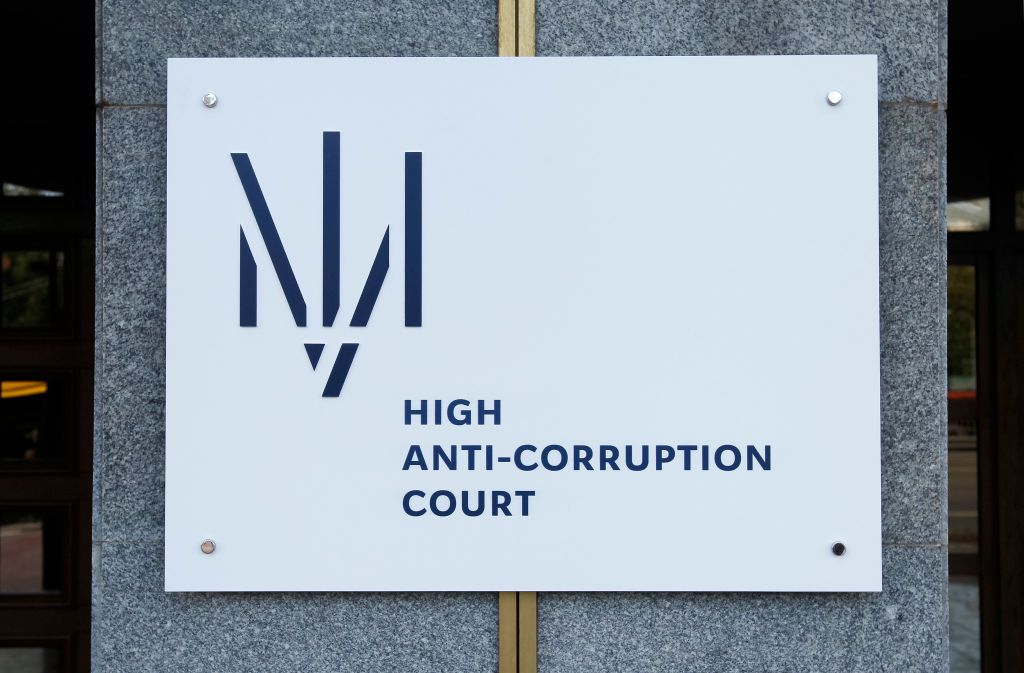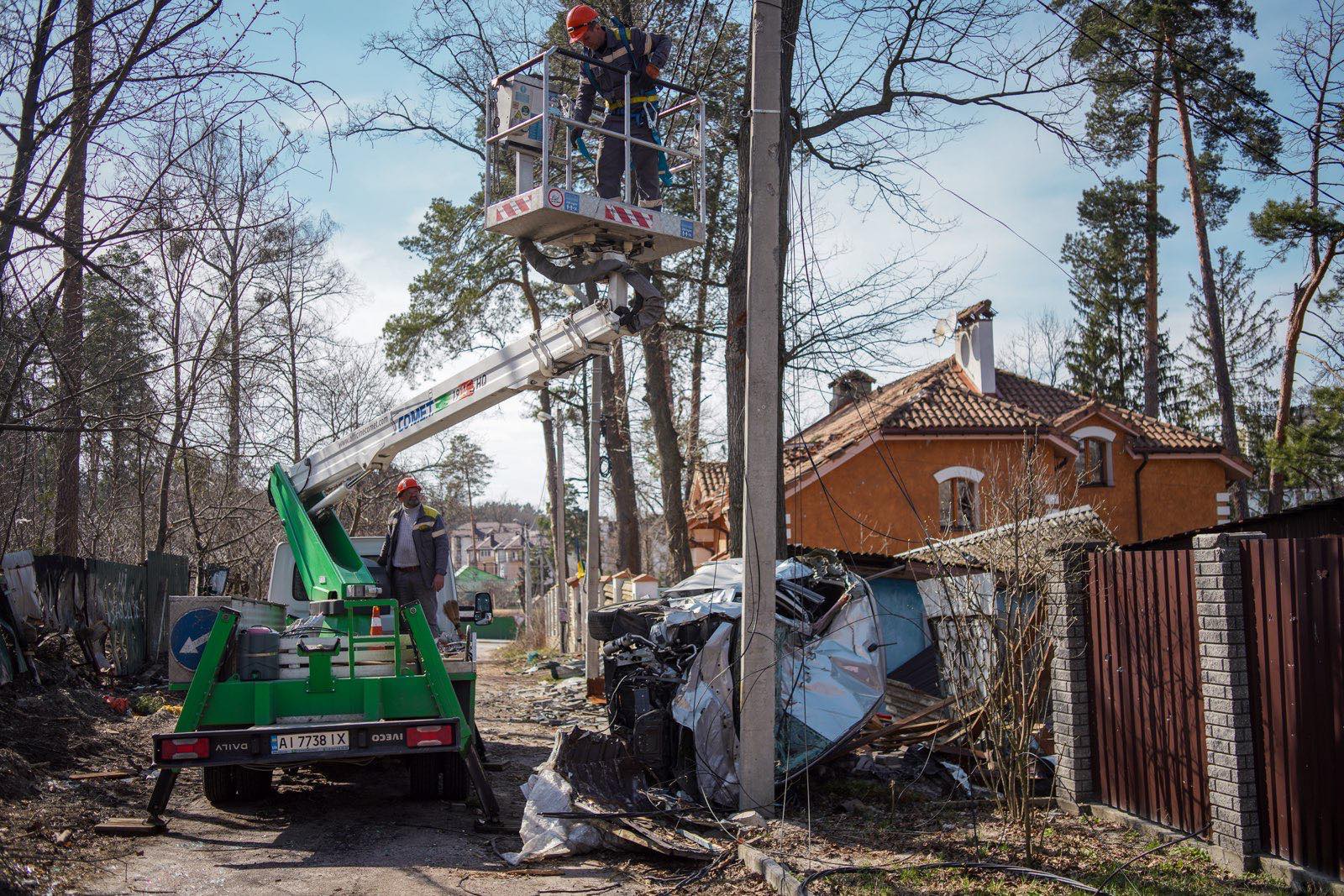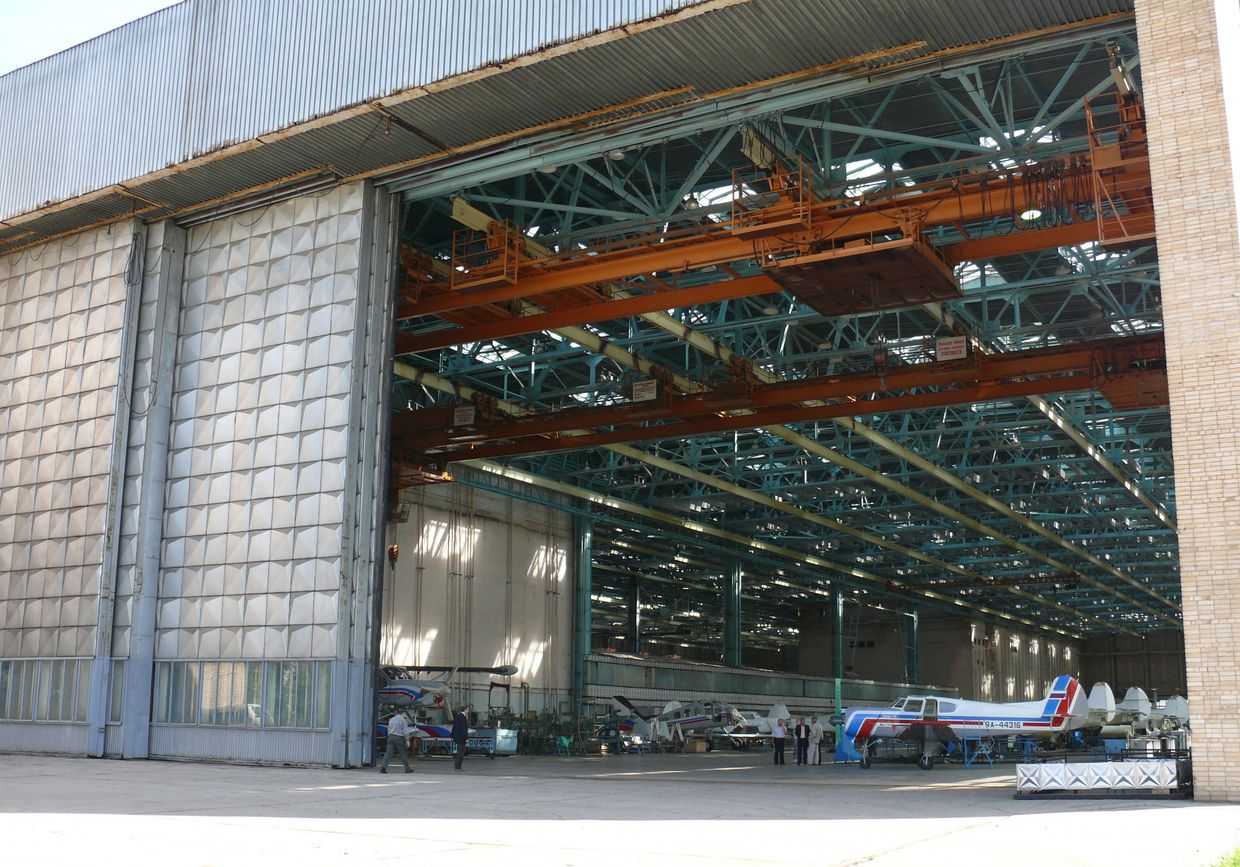Ukrainian State-Owned Enterprises Weekly — Issue 104
Editor's Note: This is issue 104 of Ukrainian State-Owned Enterprises Weekly, covering events from September 23-29, 2023. The Kyiv Independent is reposting it with permission. Ukrainian SOE Weekly is an independent weekly digest based on a compilation of the most important news related to state-owned enterprises (SOEs) and state-owned banks in Ukraine.
This publication was produced with the financial support of the European Union within the project "Supporting Ukraine in rebuilding and recovery" implemented by the KSE Institute. The contents of this publication are the sole responsibility of the editorial team of the Ukrainian SOE Weekly and do not necessarily reflect the views of the European Union.
Corporate governance of SOEs
HACC removes the electronic bracelet from Kobolyev and halves his bail to the amount paid. On Sept.
25, the High Anti-Corruption Court (HACC) partially granted the request of the attorney for the former CEO of Naftogaz Andriy Kobolyev, reducing the bail amount from Hr 229 million (£6.2 million) to Hr 107 million (£2.9 million). According to the Miller law firm, which represents Kobolyev, the bail amount was decreased to match the actual amount already paid.
According to the HACC, until Oct.
10, Kobolyev is obliged to:
- come to the detective, prosecutor, investigating judge, or court at every request;
- not leave the territory of Ukraine without the permission of detectives, prosecutors, and the court;
- notify the detective, prosecutor, and the court of any change of residence;
- refrain from communicating with persons specified in the court order; and
- deposit all passports for traveling abroad with the State Migration Service.
Kobolyev commented on the decision on his Facebook page. He wrote that the court decided to remove the electronic monitoring device and halved his bail to the level of the actual amount paid. Kobolyev added that he was waiting for the full text of the court's decision.
Miller said that Kobolyev was also allowed to move freely throughout Ukraine - before the case was heard. Earlier, his movements were limited to Kyiv and the surrounding region. In SOE Weekly Issue 99, we reported that on Aug.
9, the HACC made a decision to extend the Hr 229 million bail for another two months and left procedural obligations, including pre-trial restrictions, of Kobolyev unchanged. As we reported earlier, on Jan.
19, NABU and SAPO charged Kobolyev with illegally awarding himself a bonus of Hr 229 million for Naftogaz's victory against Russia's Gazprom in Stockholm's court of arbitration in 2018. For an extended background on the Kobolyev case, see SOE Weekly's Issues 71, 72, 73, 77, 78, 79, 83, 84, 88, 91, and 99.
For a detailed analysis of this case from a corporate governance perspective, see series of columns by SOE Weekly team members Andriy Boytsun, Oleksandr Lysenko, and Dmytro Yablonovskyi: Are Kobolyev's bonuses a threat to corporate governance reform? Part 1, Part 2, Part 3, Part 4, and Part 5.
With winter approaching, is Ukraine's energy system ready for renewed Russian attacks? The specter of Russian attacks on Ukraine's energy system looms once again as winter rapidly approaches. Last year in early October, just as Ukraine's heating season began, Russia launched a month-long series of missile and drone attacks against Ukraine's energy infrastructure, leading to blackouts...

The Cabinet changes GTSOU's owner; competitive selection begins for independent supervisory board members. On Sept.
22, Taras Melnychuk, a government representative in the Verkhovna Rada, reported that the Cabinet of Ministers had decided to transfer the corporate rights of the Gas Transmission System Operator of Ukraine (GTSOU) from the previous owner, Main Pipelines of Ukraine (MGU), directly to the Energy Ministry. This Cabinet's decision was made in accordance with Law No.
3293-IX on the merger of MGU and GTSOU, Melnychuk said. The Cabinet's resolution was not publicly available at the time of writing.
According to the State Register, MGU is still indicated as the owner of GTSOU. According to the law, the information included in the State Register is treated as official information regarding the legal entity. To change this information in the State Register, respective amendments to the charter of GTSOU should be made.
As SOE Weekly reported earlier Issue 102, Law No.
3293-IX on the merger of MGU and GTSOU introduced the legal framework to reform GTSOU. There are two stages to this process:
- First, MGU is to be merged into GTSOU, disappearing as a separate entity. The Energy Ministry gets the shareholder rights in GTSOU.
The company then gets a new charter and a supervisory board as a governing body.
- After the merger is completed, GTSOU's new supervisory board should be appointed by Oct.
31. In the interim, the current members of MGU's supervisory board will serve as GTSOU's supervisory board.
As we also wrote in Issue 102, the procedure to end MGU as a legal entity began on Sept.
5. In Issue 97, we reported that Ukraine promised the IMF to complete the corporate governance reform of GTSOU by the end of October 2023.
On Sept.
26, the Economy Ministry announced the competitive selection to find three independent members for GTSOU's supervisory board. The board will have five members in total - three independents and two state representatives. Documents from applicants are accepted through Oct.
5. See Issues 82, 89, 97, 98, 100, and 102 for more detail on the GTSOU law. White House sends Ukraine a list of priority reforms. On Sept.
25, Ukrainska Pravda (UP) reported that Mike Pyle, the White House Deputy National Security Advisor for International Economics, sent a working draft of this list to the Prime Minister, the President's Office, and the Donor Coordination Platform. The draft outlines what Ukraine needs to accomplish within 3, 6, 12, and 18 months. Later, the U.S.
Embassy confirmed sending a list of proposed reforms needed "to integrate into Europe," for consultation with Ukraine's government and key partners. Five of these items pertain to the corporate governance of SOEs.
- Seating a seventh member on Ukrenergo's and Naftogaz's supervisory boards. As we reported in SOE Weekly's Issue 95, Ukrenergo's and Naftogaz's supervisory boards still lack one member each. See more in Issue 95.
High Anti-Corruption Court provides first monetary award to whistleblower
Ukraine's High Anti-Corruption Court (HACC) announced on Oct.
2 that it had ruled to pay Hr 13.3 million (about £360,000) to a whistleblower in the case of a £6 million bribe attempted by a former first deputy head of the Kyiv tax service back in 2020.

Commenting on the need to add a seventh member to the company's supervisory board, Naftogaz's CEO Oleksiy Chernyshov said that "this is not a problem at all." "One more state representative will be added. This condition is absolutely feasible," he said.
- Completing the legislative process to corporatize Energoatom and select an independent supervisory board. In SOE Weekly Issue 74, we reported that the Verkhovna Rada adopted Draft Law No.
8067 on the corporatization of Energoatom on Feb.
6.
In Issue 79, we reported that corporate governance reform of Energoatom was among the government's priorities for 2023. According to the Cabinet's Priority Action Plan, Energoatom was to be converted into a joint-stock company by May 2023.
The nuclear power operator is also slated to receive a competitively selected supervisory board with an independent majority. The deadline was November 2023. In Issue 86, we reported that the Cabinet approved the conversion of Energoatom into a joint-stock company.
As we wrote in Issue 95, the Cabinet approved the plan for such conversion. According to the Ministry of Economy, the plan sets out the corporatization procedure for Energoatom, which started in June 2023 and should be completed by converting Energoatom into a joint-stock company in December 2023. This plan also envisages that the new supervisory board and management should be formed by March 2024.
- Transferring GTSOU ownership to the Energy Ministry, adopting a new company charter, and selecting a new independent supervisory board.
As we wrote above, the Cabinet has already transferred GTSOU's ownership from MGU to the Energy Ministry.
The company also must get a new charter and a supervisory board as a governing body. As we wrote In Issue 97, Ukraine promised the IMF to complete the corporate governance reform of GTSOU by the end of October 2023. The charter must be developed with Ukraine's energy regulator and the Energy Community Secretariat and approved by the end of July 2023 (a structural benchmark, carried over from the original IMF Memorandum, which we discussed in Issue 82.
With Law No.
3293-IX now in force, the Energy Ministry can amend GTSOU's charter, albeit two months after it was due. This will pave the way for a competitive, transparent, and merit-based nomination procedure for the new supervisory board. According to the IMF Memorandum, such a board should be appointed by the end of October 2023 (a new structural benchmark, added after the first review of the IMF program.)
- Adopting SOE corporate governance legislation (Draft Law No.
5593-d
) in alignment with OECD guidelines by autumn 2023, to ensure the transparent and merit-based nomination, selection, and reappointment of high-quality independent professionals as members of SOE supervisory boards and establish an annual evaluation procedure for the supervisory boards (preventing board members being removed in an arbitrary manner).
In SOE Weekly Issue 82, we reported that the IMF's current program requires that Ukraine should adopt a law that brings Ukraine's corporate governance framework in line with the OECD Guidelines on Corporate Governance of SOEs. Draft Law No.
5593-d is supposed to strengthen the accountability and broaden the powers of supervisory boards so they have the ultimate authority to appoint and dismiss CEOs, among other things. According to the IMF program, the law must be adopted by October 2023.
In Issue 99, we reported that the OECD Secretariat was to assess the draft law regarding the corporate governance of SOEs.
Ukraine Business Roundup -- Issue 3 The following is the third edition of our new Ukraine Business Roundup weekly newsletter. To get the biggest news in business and tech from Ukraine directly in your inbox, subscribe here.
Fresh attacks People in Ukraine are bracing themselves. Following the first mass attack on Ukraine's energy s...

In Issue 36, we reported that the Verkhovna Rada approved this bill in the first reading on 15 July 2021.
- Selecting and implementing a new supervisory board for the newly created Ukrainian Defense Industries (formerly Ukroboronprom) in alignment with OECD standards.
As we wrote in Issue 95, Ukroboronprom was officially transformed into a joint-stock company called Ukrainian Defence Industry (UDI). According to Minister for Strategic Industries Oleksandr Kamyshin, the next step in the company's transformation is to transfer staff and property, among other procedures.
After that, the supervisory board would be formed according to OECD standards. As we also reported in Issue 95, the Cabinet appointed Herman Smetanin as the CEO of the newly established UDI. In Issue 59, we reported that in July 2021, the Verkhovna Rada adopted Law 1630-IX (previously known as Draft Law No.
3822) which laid the groundwork for Ukroboronprom's transformation. The concept of corporate governance reform and conversion of Ukroboronprom, including its target model and detailed action plan, was drafted by Andriy Boytsun, Oleksandr Lysenko, and Dmytro Yablonovskyi, members of the SOE Weekly team, as well as the international law firm Kinstellar, in March 2020. For a discussion of these documents, see the OECD Review of the Corporate Governance of State-Owned Enterprises in Ukraine.
According to 18-Month Priorities, in addition to establishing a supervisory board, UDI should also build stronger institutional connections (e.g., liaison or procurement offices) with the Defense Ministry and General Staff planning, to ensure that the company's work is aligned with Ukraine's most pressing needs. According to the letter, UDI should also ensure NATO standards of transparency, accountability, efficiency, and competition across the defence industrial sector. Another task is to institute transparency procedures (even considering wartime needs for secrecy) to allow later audit and avoid even the appearance of politicisation or corruption in defence production.
Fiscal risks
The Ministry of Finance releases a fiscal risk statement; a large part of risks in 2024 relate to SOEs. Major fiscal risks include, among other things:
- SOEs' operations; and
- state debt management [including loans to SOEs guaranteed by the state - SOE Weekly].
Fiscal risks with a relatively low impact include:
- failure to fulfill privatization revenue plans; and
- financial sector.
As we wrote in Issue 96, the National Bank of Ukraine (NBU) warned of risks posed by a high share of state capital in the banking sector.
In Issue 98, we wrote that according to NBU Governor Andriy Pyshnyi, the state's share of assets in the banking system was growing by 3.3% to 56% as a result of Sense Bank's nationalization. In addition to evaluating fiscal risks, the report also provides some 2022 SOE data that had been restricted when the full-scale Russian invasion began. Our selection of key findings from the Finance Ministry's fiscal risk statement is presented below.
SOEs' operations. As of April 1, there were a total of 3,210 SOEs, according to the fiscal risk statement. Just 1,058 (34%) released information about their activities in 2022:
- 594 SOEs (56%) reported profits for 2022, with a combined Hr 22.6 billion (£615 million);
- 399 SOEs (38%) reported losses for 2022, totalling Hr 113.9 billion (£3.1 billion); and
- 65 (6%) SOEs broke even.
In 2022, these SOEs incurred a net financial loss of Hr 91.3 billion (£2.5 billion), compared to Hr 30.3 billion (£825 million) profit reported in 2021. Entities reporting the biggest losses in 2022 were:
- Naftogaz with Hr 36.6 billion (£996 million);
- State Food and Grain Corporation of Ukraine with Hr 11.1 billion (£302 million);
- Energorynok with Hr 9.8 billion (£266 million); and
- Ukrzaliznytsia with Hr 9.6 billion (£261 million).
The most profitable entities in 2022 included:
- Ukrhydroenergo with Hr 11.8 billion (£321 million);
- Ukrainian Financial Housing Company with Hr 1.5 billion (£1.5 billion);
- Antonov with Hr 1.3 billion (£35 million);
- Zorya-Mashproekt with Hr 1.1 billion (£30 million).
In 2022, SOEs contributed Hr 46.9 billion (£1.3 billion), equivalent to as little as 0.9% of GDP, to the state budget through dividend payments.
Finance Ministry's recommendations to mitigate SOE-related fiscal risks include:
- improving state property management;
- ensuring transparency and accountability by improving SOEs' disclosure;
- facilitating a transparent privatization process for SOEs, accelerating restructuring, and liquidating non-operational SOEs; and
- resolving debt issues.
Politico: White House more worried about corruption in Ukraine than it publicly admits U.S. President Joe Biden's administration prepared a confidential strategy document that sees corruption in Ukraine as the real threat, allegedly warning that Western support may depend on Kyiv's anti-graft efforts, Politico reported on Oct.
2.

State debt management. During 2022, the state provided Hr 47.1 billion (£1.3 billion) in state guarantees, according to the fiscal risk statement:
- Hr 10.6 billion (£288 million) for Naftogaz;
- Hr 6.2 billion (£169 million) for Ukrhydroenergo; and
- Hr 1.3 billion (£35 million) for Ukrenergo.
Ukrenergo's Hr 11.9 billion (£324 million) guarantee, which was provided in December and came into effect in the first half of 2023, was meant to secure Ukrenergo's commitment to a 300-million-euro loan agreement with the European Bank for Reconstruction and Development (EBRD). This measure was implemented to bolster the liquidity and stability of Ukrenergo's operations. In SOE Weekly Issue 103, we reported on the recent Russian missile attack on Ukrenergo's energy facilities.
See more in Issue 103. See more on the previous waves of Russia's mass attacks in SOE Weekly's Issues 66, 72, 74, 78, and 86. Failure to achieve target privatization revenues. The state budget for 2023 planned to receive Hr 6 billion (£163 million) from the privatization of state property.
By July 31, small-scale auctions only brought in Hr 2.1 billion (£57 million), just over a third of the plan. To keep making money from privatization in 2024, the fiscal risk statement recommends that:
- large-scale privatizations must be open, transparent, and consistent with up-to-date legislation;
- over 300 small-scale assets must be sold;
- SOEs' corporate governance reform must continue; and
- co-operation with international partners must go on to attract investments in Ukraine's real economic sectors.
Financial sector. According to the statement, the destruction and devaluation of assets, along with decreased income, and the weakening solvency of borrowers, are contributing to a decline in the quality of banks' loan portfolios. In 2022, the proportion of non-performing loans (NPLs) in the loan portfolios of state-owned banks increased by 5%, from 47.1% to 53.05%.
To mitigate fiscal risks related to state-owned banks, it is imperative to:
- update the reform strategy for state-owned banks; and
- revise state-owned banks' individual strategies, accounting for long-term conditions and security uncertainties.
Energy sector
Naftogaz takes over another one of Firtash's gas distribution companies. On Sept.
25, Gas Distribution Networks of Ukraine LLC (Gazmerezhi brand), a Naftogaz subsidiary, reported that it started the planned integration of Cherkasygaz into Naftogaz Group. Cherkasygaz reported in December 2012 that Naftogaz's stake in the company decreased from 51% to 9.97%, Interfax Ukraine wrote. The State Property Fund of Ukraine (SPFU) stated in 2012 that the government had not made a decision to privatize the state-owned stake in the company, and the SPFU had not received any shares.
At that time, Interfax Ukraine reported that Lasfano Ukraine LLC, related to fugitive oligarch Dmytro Firtash, became one of the Cherkasygaz's owners. In 2021, the National Security and Defense Council ordered to return Cherkasygaz to the state ownership. The restart of the company's operations would begin by preparing the region's critical infrastructure for the 2023-2024 heating season.
In addition to modernizing technical processes, the company will prioritize meeting all of its financial obligations and improving customer service, Gazmerezhi said. In SOE Weekly Issue 71, we reported that Naftogaz changed the management of regional gas distribution companies Kharkivgaz and Dniprogaz on Jan.
16. Both were also part of Firtash's Regional Gas Company (RGC) Group.
RGC accused Naftogaz of an "attempted raid." In response, Naftogaz referred to the Cabinet of Ministers' Decision No.
429-r dated May, 28 2022, which transferred the corporate rights of about 20 regional gas distribution companies to its subsidiary Chornomornaftogaz. Earlier in May 2022, Kyiv's Pechersk Court seized shares of Firtash's regional gas companies because they evaded payment for the use of gas networks. (After that, the Cabinet transferred these rights to Chornomornaftogaz.) RGC then filed lawsuits to overturn the Pechersk Court's decision. This delayed the change of management of these distribution companies.
In September 2022, Naftogaz established a new subsidiary named Gas Distribution Networks of Ukraine LLC to consolidate the regional gas distribution companies. In Issue 98, we reported on another wave of taking over Firtash's gas distribution companies. See more in Issue 98.
In Issue 100, we reported that Ivano-Frankivskgaz, Khmelnytskygaz and Mykolaivgaz, which were part of Firtash's RGC Group, joined Naftogaz Group. See more in Issue 100. Ukrenergo's CEO Kudrytskyi interviewed. Ukrenergo's CEO Volodymyr Kudrytskyi was interviewed by RBC-Ukraine this week.
We selected the key points. On Russian missile attack on Ukrenergo energy facilities on Sept.
21:
- "It is very difficult to say whether this can be considered as the beginning of massive shelling of the power system. In fact, I would not draw any far-reaching conclusions from this case alone.
Last year, in September, there was also an attack on energy facilities. It had quite large-scale consequences, and our employees were killed. After that, there was a month-long lull, and only on Oct.
10, 2022 did a systematic campaign of attacks on the Ukrainian power grid, on Ukrenergo substations, and power plants begin."
- "In fact, the enemy is shelling Ukraine almost every day, sending dozens of drones and missiles, as it did on Sept.
21 Indeed, some energy facilities have been damaged, including the Ukrenergo facility in the western region. But we managed to restore the power supply quite quickly."
- "I can't say whether the damage was serious or not. We do not give such information to the enemy.
We can state as a fact that we were able to restore power supply quite quickly, in the morning after the shelling."
As we wrote in SOE Weekly's Issue 103, Ukrenergo reported that Russia launched another missile attack on Ukraine's energy infrastructure on Sept.
21 - the first since March 2023. See Issue 103 for more detail.
DTEK: Russian strikes damage warehouses in Dnipropetrovsk Oblast Russian forces attacked warehouses of Ukraine's largest private energy company DTEK in Dnipropetrovsk Oblast on Oct.
2, causing damage to cables, transformers, and other electrical equipment, the company said on the Telegram messaging app.

On preparing for the heating season:
- "The measures we planned to take in Ukrenergo's trunk power grids have almost been completed. And now the repair campaign at generation facilities is nearing completion."
- "We will certainly have a slightly lower safety margin in the power system as a whole than we had at the start of the massive missile campaign last year. This is because it is impossible to restore all facilities to 100% in the seven or eight months that have passed since the end of the last heating season."
In Issue 78, we reported on a large missile and drone attack on Ukraine's energy infrastructure on March 9.
This was Russia's 15th mass strike, Ukrenergo said then. After every Russian mass missile attack on Ukraine's vital infrastructure in autumn 2022 and winter 2023, there were emergency outages, lasting for days due to the ongoing repair works. During such outages, people in Ukraine were left without electricity, heating, water supply, or access to mobile phone networks.
See more on the previous waves of Russia's mass attacks in SOE Weekly's Issues 66, 72, 74, and 78. On the search of Ukrenergo's headquarters:
- "In this audit by the State Audit Service of Ukraine (SASU), there were a lot of episodes, a lot of things that, in my opinion, are far-fetched or sometimes fictitious. Therefore, I can't say specifically that our colleagues from law enforcement agencies are interested in a particular episode, a particular contract, or something else.
- "They have basically requested a certain number of documents, and we are preparing these documents.
So formally, the search is ongoing, but it is taking place in a constructive format, when we were told to select some contracts or other documents to be provided, and we are collecting them and handing them over."
- "It is not a classic search with security forces with the aim of some spectacular actions. It is rather a procedure for obtaining documents. It is difficult for me to say why this is done in the format of a search and not in the format of a warrant to seize documents, which is a more common form of obtaining them."
- "There are a lot of episodes.
There are maybe a dozen and a half of them. It is hard for me to say what exactly they are looking for, I don't even want to get into that now. This is a matter for law enforcement agencies, what exactly they are interested in."
As we wrote in Issue 103, Ukrenergo reported that the Prosecutor General's Office (PGO) searched its head office by order of the Pechersk District Court issued on 30 August 2023.
See more detail on this case in Issue 103.
Confiscation of the Russian assets, nationalization, and asset seizure
Ukrnafta signs an agreement with ARMA to manage the seized Glusco petrol station chain. On Sept.
27, Ukrnafta reported that it signed an agreement with the Asset Recovery and Management Agency (ARMA) to manage the Glusco chain. According to Ukrnafta, the state will get 85% of net profits, with minimal monthly payments of Hr 5 million (£136 million). Ukrnafta's management fee will be 15% of net profits.
According to Ukrnafta's CEO Sergii Koretskyi, now that the agreement has been signed, the actual transfer of Glusco's assets into Ukrnafta's management should begin. In Issue 102, we reported that the Cabinet Ministers decided to place the chain under Ukrnafta's management. For more detail on the Glusco case, see SOE Weekly's Issues 99, 100, and 102.
Ukraine war latest: Oct.
1 strikes on Russian plant disrupted missile manufacturing, military intelligence says
Key developments on Oct.
2: * Military intelligence reports Oct.
1 strikes on Russian plant disrupted missile manufacturing * Poland delivers refurbished Leopard 2 tanks to Ukraine * Minister: Units supported by 'Army of Drones' hit record number of Russian artillery over last week * Air Force:...
